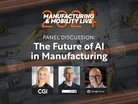Manufacturing & Mobility LIVE: The Future of AI

At Manufacturing & Mobility LIVE, industry leaders explored the challenges and opportunities of integrating artificial intelligence (AI) into manufacturing.
Panellists include:
- Helena Jochberger, Vice-president, Global Lead Manufacturing at CGI
- Scott Hofmann, Chief Revenue Officer (US) at GFT
- Fabian Duboeuf, Industry Manager (Manufacturing) at Google Cloud
The session tackled data integration, AI strategies and the workforce transformations required for success.
To watch the 'Future of AI in Manufacturing' panel, click here.
Challenges in implementing AI
The discussion begins with the challenges of integrating AI into existing processes. Fabian emphasises the importance of aligning AI initiatives with business and data strategies.
“People need to understand the ‘why’ behind the transformation,” he says, highlighting the need for clear communication and alignment across all organisational levels.
Scott Hoffman notes that data silos present a significant technical hurdle.
Legacy systems often lack the infrastructure for comprehensive data sharing, making it difficult to establish a unified source of truth.
Helena adds that while many companies have data strategies, these often fail to extend beyond their own operations to encompass broader ecosystems, limiting the potential for collaboration.
Laying the groundwork for AI adoption
The panellists underscore the importance of a strong data foundation.
Scott advises starting with an inventory of existing data, assessing its quality, and identifying gaps. This step-by-step approach helps organisations develop a data aggregation strategy and ensures readiness for AI deployment.
Helena suggests focusing on specific business processes – whether in R&D, supply chain or production – to clarify data requirements. She stresses the need for industry standards and collaboration through initiatives like Gaia-X, which promote data sovereignty and interoperability.
Fabian highlights the role of edge computing in manufacturing.
“Leveraging the edge is critical for AI success,” he says, explaining that real-time data processing at the source enables quicker decision-making and better integration into operational workflows.
AI’s transformative potential
The session showcased examples of AI driving significant improvements in manufacturing:
- Predictive maintenance: Predictive analytics are already reducing downtime by forecasting equipment failures and identifying root causes. Fabian notes that these capabilities also extend to determining the necessary parts and technicians required for repairs.
- Quality assurance: AI-powered visual inspection systems detect defects in real-time, improving production quality and reducing waste. Scott highlights advancements in generative AI that allow organisations to interrogate entire systems, enabling root-cause analysis and scenario planning.
- R&D acceleration: Helena discusses how generative AI is helping manufacturers shorten product development cycles by simulating complex designs and testing scenarios. This capability is particularly valuable in high-complexity industries like aerospace and automotive.
Customer experience: AI is transforming how companies engage with customers, from enhancing in-vehicle experiences to providing digital access to product manuals. These improvements align with evolving consumer expectations around sustainability and usability.
Preparing the workforce for AI integration
The panellists agrees that workforce readiness is critical to AI adoption. Fabian highlights the importance of making AI tools accessible and intuitive, allowing employees to focus on high-value tasks rather than manual data entry.
Scott envisions AI as a ‘coworker’ that supports employees on the factory floor without requiring extensive retraining.
Helena adds that leadership plays a crucial role in fostering a data-driven culture, where employees understand the value of data and are motivated to use it effectively.
Gaining a competitive edge
AI offers manufacturers a competitive advantage by enabling faster, cheaper and more sustainable operations.
Scott stresses the urgency of adoption: “If you’re not doing this, your competitors will.”
Helena highlights the role of AI in supply chain agility, from predicting inventory shortages to automating procurement. She points to its potential in product innovation, where AI-driven ideation and prototyping can give companies a decisive edge.
Fabian also links competitiveness to customer expectations.
“The companies embracing AI are transforming how they sell, moving from hardware capabilities to delivering connected experiences and meeting sustainability goals,” he says.
Navigating a crowded AI marketplace
With countless AI tools on the market, the speakers advise manufacturers to focus on scalability and interoperability.
“Standardisation is key,” Fabian says, warning against the pitfalls of adopting multiple, siloed solutions.
Scott echoes this sentiment, urging companies to “think big but act small” by starting with manageable AI projects that align with broader strategic goals.
Helena encourages collaboration through industry ecosystems and leveraging systems integrators to navigate complex technology landscapes.
“Don’t reinvent the wheel,” she advises.
To watch the 'Future of AI in Manufacturing' panel, click here.
Essential diary dates for 2025
Discover the essential diary dates for Manufacturing Digital, as well as its sister publications – Procurement Magazine, Supply Chain Digital and Sustainability Magazine.
To follow Manufacturing LIVE on LinkedIn, click here.
To enter for the Global Procurement & Supply Chain Awards, click here.
- Procurement & Supply Chain LIVE Singapore | 11 February
- Procurement & Supply Chain LIVE: Sustainability | 5-6 March
- Sustainability LIVE: Net Zero | 5-6 March
- Procurement & Supply Chain LIVE Dubai | 29 April
- Sustainability LIVE Chicago | 28-29 May
- Procurement LIVE Chicago | 28-29 May
- Supply Chain LIVE Chicago | 28-29 May
- Manufacturing & LIVE Chicago | 28-29 May
- Procurement & Supply Chain LIVE London | 23-24 September
- Procurement & Supply Chain Awards | 24 September
Explore the latest edition of Manufacturing Digital and be part of the conversation at our global conference series, Manufacturing LIVE.
Discover all our upcoming events and secure your tickets today.
Manufacturing Digital is a BizClik brand.

